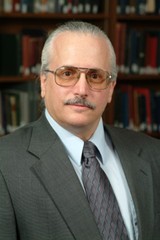David Magier Appointed Director of New Center for Human Rights Documentation and Research

NEW YORK, April 23, 2007 David Magier has been appointed Director of the Center for Human Rights Documentation and Research (CHRDR) at Columbia University Libraries, an international documentation center for the global human rights movement.
In announcing the new Center, Jim Neal, Columbia's Vice President for Information Services and University Librarian, stated, “ Columbia is a global interdisciplinary center for education and research on all aspects of human rights. It is appropriate that the Libraries develop a fuller capacity to support scholarship through the acquisition of these invaluable archives and through the development of a wide range of services and programs in partnership with the Columbia faculty.”
Dr. Magier has a distinguished career in International Studies. In addition to his role as Director of CHRDR, he will continue as Director of Area Studies, Columbia University Libraries, a post he has held since 1990. Since 1987, he has also been the South & Southeast Asia Librarian at Columbia University Libraries and has served as Adjunct Professor. Magier has an MA and Ph.D. in South Asian Languages and Linguistics from UC Berkeley, and has field research experience in both India and Pakistan. His work as the President of the Center for South Asia Libraries and in developing the Digital South Asia Library are well known examples of international library and archive collaboration.
The Center for Human Rights Documentation and Research was formed as the result of three prominent Human Rights organizations choosing Columbia University to house their vast collections of documents. The archives of Human Rights Watch, Amnesty International USA, and the Committee of Concerned Scientists are administered by Columbia’s Rare Book and Manuscripts Library, and several other important organizations, including Human Rights First (formerly Lawyers Committee for Human Rights) and Physicians for Human Rights have indicated a strong interest in depositing their archives at Columbia as well. This remarkable body of material (spanning more than 3,700 linear feet) details each organization’s decades of human rights work, making CHRDR the most extensive compilation of human rights archives available anywhere. The CHRDR archives complement Columbia’s existing human rights programs, many of which will draw on these new resources for teaching and research.
“It is impossible to overestimate the importance of learning from our past. This is especially true of the life-saving work in the human rights field, which has advanced so rapidly over the last 40 years. We are very grateful to the Center for Human Rights Documentation and Research at Columbia University Libraries for preserving the history of our crucial global work,” said Larry Cox, Executive Director of Amnesty International USA.
As Director, Magier will manage the activities of CHRDR. Along with the core archives of human rights NGOs, the Center maintains a professional archiving staff, a depositor advisory board, and is developing ongoing programs of human rights lectures, exhibitions, conferences, publications, and other activities.
Columbia University Libraries is one of the top ten academic library systems in the nation, with 9.2 million volumes, over 65,650 serials, as well as extensive collections of electronic resources, manuscripts, rare books, microforms, and other nonprint formats. The collections and services are organized into 25 libraries, supporting specific academic or professional disciplines. Columbia Libraries employs more than 400 professional and support staff to assist faculty, students, and researchers in their academic endeavors. The Libraries’ website at www.columbia.edu/cu/lweb/ is a gateway to its print and electronic collections and to its services.
The Rare Book and Manuscript Library owns over 600,000 rare books in some 20 book collections and almost 26 million manuscripts in nearly 2,600 separate manuscript collections. It is particularly strong in English and American literature and history, classical authors, children’s literature, education, mathematics and astronomy, economics and banking, photography, the history of printing, New York City politics, librarianship, and the performing arts. Individual collections are as eclectic as they are extensive. For additional information about the Rare Book and Manuscript Library, please call 212-854-5153.
-END-
04/23/07 LMK